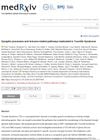47 citations,
December 2011 in “Experimental Dermatology” CGRP may help protect hair follicles from immune system attacks, potentially slowing hair loss.
 1 citations,
April 2020 in “medRxiv (Cold Spring Harbor Laboratory)”
1 citations,
April 2020 in “medRxiv (Cold Spring Harbor Laboratory)” The study found that Tourette Syndrome may be linked to certain immune system processes and synaptic signaling.
223 citations,
January 2000 in “BioFactors” Food-derived peptides may help prevent diseases like high blood pressure and high cholesterol, and can support the immune system.
5 citations,
August 1981 in “Archives of Dermatology” Alopecia areata may be caused by the immune system attacking hair follicles.
 17 citations,
July 1994 in “Journal of Dermatological Science”
17 citations,
July 1994 in “Journal of Dermatological Science” The cause of alopecia areata is likely a mix of genetics, immune system issues, and environmental factors, with more research needed to understand it fully.
 January 2023 in “International Journal of Homoeopathic Sciences”
January 2023 in “International Journal of Homoeopathic Sciences” Homoeopathic treatment may help restore hair in Alopecia Areata by balancing the immune system.
 February 2009 in “Journal of The American Academy of Dermatology”
February 2009 in “Journal of The American Academy of Dermatology” Certain immune system genes are linked to a higher risk of psoriasis and psoriatic arthritis, while others may offer protection.
 9 citations,
March 2015 in “International reviews of immunology”
9 citations,
March 2015 in “International reviews of immunology” Skin abnormalities can indicate immunodeficiency due to shared origins with the immune system.
32 citations,
February 2020 in “PTR. Phytotherapy research/Phytotherapy research” Rosemary extract may boost the immune system, but more research on humans is needed to confirm this.
 1 citations,
July 2023 in “Frontiers in Immunology”
1 citations,
July 2023 in “Frontiers in Immunology” Oxidative stress and immune dysfunction are linked to both Hashimoto's thyroiditis and polycystic ovary syndrome, with diet and specific treatments important for managing these conditions.
 1 citations,
August 2021 in “Movement disorders clinical practice”
1 citations,
August 2021 in “Movement disorders clinical practice” A man with Isaac's syndrome affecting only one side of his body improved after immune system-targeted treatment.
 16 citations,
June 2017 in “Advances in Therapy”
16 citations,
June 2017 in “Advances in Therapy” New treatments for hair loss are showing promise due to better understanding of genetics and the immune system.
January 2024 in “Ageing & longevity” Good nutrition and essential trace elements like zinc, selenium, and iron are important for a strong immune system and reducing COVID-19 severity.
 188 citations,
March 2018 in “Frontiers in Immunology”
188 citations,
March 2018 in “Frontiers in Immunology” Regulatory T-cells are important for healing and regenerating tissues in various organs by controlling immune responses and aiding stem cells.
 4 citations,
May 2020 in “PLOS ONE”
4 citations,
May 2020 in “PLOS ONE” Ingenol mebutate gel changes gene expression related to skin development and immune response in actinic keratosis.
 191 citations,
May 2018 in “British journal of dermatology/British journal of dermatology, Supplement”
191 citations,
May 2018 in “British journal of dermatology/British journal of dermatology, Supplement” Alopecia areata is likely an autoimmune disease with unclear triggers, involving various immune cells and molecules, and currently has no cure.
 41 citations,
September 1991 in “Medical hypotheses”
41 citations,
September 1991 in “Medical hypotheses” Prolactin may be important for skin growth and immune function.
 5 citations,
November 2011 in “Expert Review of Dermatology”
5 citations,
November 2011 in “Expert Review of Dermatology” The document concludes that early diagnosis and a comprehensive treatment plan are crucial for managing hair loss in children, with a focus on both medical and psychological support.
 February 2024 in “Recima21”
February 2024 in “Recima21” Covid-19 can cause hair loss due to immune and psychological factors.
 27 citations,
August 2014 in “Wiley interdisciplinary reviews. Developmental biology”
27 citations,
August 2014 in “Wiley interdisciplinary reviews. Developmental biology” The skin and thymus develop similarly to protect and support immunity.
 16 citations,
December 2006 in “Expert Review of Dermatology”
16 citations,
December 2006 in “Expert Review of Dermatology” Hair follicles are essential for skin health, aiding in hair growth, wound healing, and immune function.
 1 citations,
January 2023 in “Przegla̧d dermatologiczny”
1 citations,
January 2023 in “Przegla̧d dermatologiczny” Zinc may be linked to vitiligo development and severity, but its role is not fully understood and zinc supplementation benefits are unclear.
 135 citations,
December 2013 in “Seminars in Cell & Developmental Biology”
135 citations,
December 2013 in “Seminars in Cell & Developmental Biology” Stem cells in the hair follicle are regulated by their surrounding environment, which is important for hair growth.
 36 citations,
October 1996 in “Dermatologic Clinics”
36 citations,
October 1996 in “Dermatologic Clinics” Mice are useful for researching human hair loss and testing treatments, despite some differences between species.
 31 citations,
May 2008 in “Drug Discovery Today: Disease Mechanisms”
31 citations,
May 2008 in “Drug Discovery Today: Disease Mechanisms” Different hair growth problems are caused by genetic issues or changes in hair growth cycles, and new treatments are being developed.
 February 2024 in “The Open dermatology journal”
February 2024 in “The Open dermatology journal” Alopecia Areata affects people of all ages worldwide, is likely caused by genetic and environmental factors, and can lead to stress and depression, highlighting the need for treatments that address both physical and mental health.
41 citations,
May 2020 in “Frontiers in immunology” Hidradenitis suppurativa might be a type of autoinflammatory skin disease.
 4 citations,
November 2014
4 citations,
November 2014 The skin protects the body, regulates temperature, senses touch, and makes vitamin D.
 1 citations,
January 2017 in “Organic chemistry”
1 citations,
January 2017 in “Organic chemistry” Tridax procumbens has medicinal properties like healing, pain relief, and infection control.
 31 citations,
January 2021 in “Experimental Dermatology”
31 citations,
January 2021 in “Experimental Dermatology” Skin organoids are a promising new model for studying human skin development and testing treatments.























